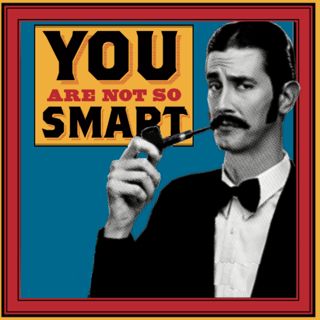
129 - Desirability Bias (rebroadcast)
Confirmation bias is our tendency to seek evidence that supports our beliefs and confirms our assumptions when we could just as well seek disconfirmation of those beliefs and assumptions instead.This is such a prevalent feature of human cognition, that until recently a second bias has been hidden in plain sight. Our past beliefs and future desires usually match up. Desirability is often twisted into confirmation like a single psychological braid - but recent research suggests that something called desirability bias may be just as prevalent in our thinking. When future desires and past beliefs are incongruent, desire wins out.- Show notes at: www.youarenotsosmart.com- Become a patron at: www.patreon.com/youarenotsosmartPatreon: http://patreon.com/youarenotsosmart
4 Kesä 201828min

128 - Happy Brain
What makes you happy? As in, what generates happiness inside the squishy bits that reside inside your skull? That's what author and neuroscientist Dean Burnett set out to answer in his new book, Happy Brain, which explores both the environmental and situational factors that lead to and away from happiness, and the neurological underpinnings of joy, bliss, comfort, love, and connection. In the episode you'll hear all that and more as we talk about what we know so far about the biological nature of happiness itself.Patreon: http://patreon.com/youarenotsosmart
21 Touko 20181h 28min

127 - Selfie
In this episode, we sit down with author Will Storr to talk about his new book -- Selfie: How We Became so Self-Obsessed, and What it is Doing to Us.The book explores what he calls “the age of perfectionism” -- our modern struggle to meet newly emerging ideals and standards that tell us we are falling short of the person we ought to be. As he says in the book, "Perfectionism is the idea that kills," and you’ll hear him explain what he means by that in the interview.Patreon: http://patreon.com/youarenotsosmart
7 Touko 20181h 23min

126 - Separate Spheres (rebroadcast)
Despite their relative invisibility, a norm, even a dying one, can sometimes be harnessed and wielded like a weapon by conjuring up old fears from a bygone era. It’s a great way to slow down social change if you fear that change. When a social change threatens your ideology, fear is the simplest, easiest way to keep more minds from changing.In this episode of the You Are Not So Smart Podcast, we explore how the separate spheres ideology is still affecting us today, and how some people are using it to scare people into voting down anti-discrimination legislation.Patreon: http://patreon.com/youarenotsosmart
22 Huhti 201835min

125 - Status Quo Rationalization
When faced with an inescapable and unwanted situation, we often rationalize our predicament so as to make it seem less awful and more bearable, but what if that situation is a new law or a new administration? The latest research suggests that groups, nations, and cultures sometimes rationalize the new normal in much the same way, altering public opinion on a large scale.Patreon: http://patreon.com/youarenotsosmart
9 Huhti 201845min

124 - Belief Change Blindness
When was the last time you changed your mind? Are you sure?In this episode we explore new research that suggests for the majority of the mind change we experience, after we update our priors, we delete what we used to believe and then simply forget that we ever thought otherwise.In the show, psychologists Michael Wolfe and Todd Williams, take us though their new research which suggests that because brains so value consistency, and are so determined to avoid the threat of decoherence, we hide the evidence of our belief change. That way, the story we tell ourselves about who we are can remain more or less heroic, with a stable, steadfast protagonist whose convictions rarely waver -- or, at least, they don’t waver as much as those of shifty, flip-flopping politicians.This can lead to a skewed perception of the world, one that leads to the assumption that mind change is rare and difficult-to-come-by. And that can lead to our avoiding information that might expand our understanding of the world, because we assume it will have no impact.The truth, say Wolfe and Williams, is that mind change is so prevalent and constant, that the more you expose yourself to counterevidence, the more your worldview will erode, replaced by a better, more accurate one -- it's just that you probably won't realize it until you look back at old posts on social media and cringe.Patreon: http://patreon.com/youarenotsosmart
26 Maalis 201840min

123 - Active Information Avoidance (rebroadcast)
Little did the champions of the Enlightenment know that once we had access to all the facts…well, reason and rationality wouldn’t just immediately wash across the land in a giant wave of enlightenment thinking. While that may be happening in some ways, the new media ecosystem has also unshackled some of our deepest psychological tendencies, things that enlightenment thinkers didn’t know about, weren’t worried about, or couldn’t have predicted. Many of which we’ve discussed in previous episodes like confirmation bias, selective skepticism, filter bubbles and so on. These things have always been with us, but modern technology has provided them with the perfect environment to flourish.In this episode, we explore another such invasive psychological species called active information avoidance, the act of keeping our senses away from information that might be useful, that we know is out there, that would cost us nothing to obtain, but that we’d still rather not learn. From choosing not to open open bills, visit the doctor, check your bank account, or read the nutrition information on the back of that box of Girl Scout Cookies, we each choose to remain ignorant when we’d rather not feel the anguish of illumination, but that same tendency can also cause great harm both to individuals and whole cultures when it spreads through politics, science, markets, and medicine. In this show, you’ll learn how.Patreon: http://patreon.com/youarenotsosmart
11 Maalis 201828min

122 - Tribal Psychology
The evidence is clear that humans value being good members of their tribes much more than they value being correct. We will choose to be wrong if it keeps us in good standing with our peers.In this episode, we explore how that affects politics and science communication, and how it is driving our growing partisan divide.Patreon: http://patreon.com/youarenotsosmart
26 Helmi 20181h 5min






















